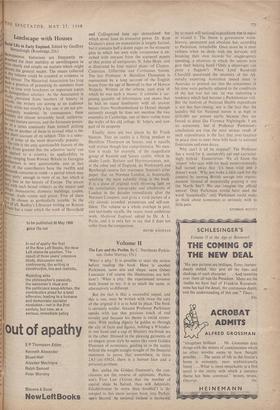Volume II
The Law and the Profits. By C. Northcote Parkin- son. (John Murray, 15s.) , 'WHAT a pity.' It is possible to start the review before reading the book. Here is another Parkinson, same size and shape, same Osbert Lancaster ('of course the illustrations are bril- liant'). 'What a pity,' the experienced reviewer feels bound to say, it is so much the same, or alternatively so different.
But the fact is that a successful sequel, and this is one, must be written with twice the care of the original if it is to hold its place. The book is certainly similar, because Professor Parkinson speaks with just that precious touch of real novelty and because his theme is social econo- mics. With smiling dignity he guides us through the city of facts and figures, holding a Whitaker in one hand and a cup of Ministry tea-break tea in the other. Dressed in the pleasing garments of an elegant prose style he seems like some Golden Dustman of economics, guiding us to the reality behind the nought-nought-nought of the financial statement to prove that somewhere, in form 2A3 /cjn/ 05824, there is a human face and a personal problem.
But, unlike the Golden Dustman's, the con- clusions are the reverse of optimistic. Parkin- son's First Law ('Given that the number of capital ships be halved, then will Admiralty Establishment be more than doubled') is de- veloped in this more Serious book into Parkin- son's SecOnd. As national' income is increased, by so much will national expenditure rise to equal or exceed it. The theme is government waste. historic, permanent and absolute, but, according to Parkinson, remediable. Once more he is most ruthless when he deals with the Services, still breaking their own records for inappropriate spending, a situation in which the unions now give their helping hand ('Only a shipwright can paint a flagpole'). When Lord Randolph . Churchill questioned the necessity of the Ad- miralty exporting Australian tinned meat 'o Australia or pointed out that the armaments of his time were perfectly adapted to the conditions of the last war but one he was indicating a tendency which had become a Parkinsonian rule. But the analysis of National Health expenditure is not less hair-raising., nor is the fact that the laundry bill for National nurses is as high as £650,000 per annum partly because they are forced to dress like Florence Nightingale. I am no economist. but if Professor Parkinson's conclusions are true the most serious result of such expenditures is the fact that over-taxation in peace time to meet these bills leads to national frustration and even decay.
Why can't it all be stopped? The Professor has a word for it. memorably apt and excruciat- ingly hybrid: Esoterrorism. We all know the `expert' who says with his back esoterroristically half turned away that 'it's been tried and it doesn't work.' Why not make a little cash for the country by turning British sewage into organic manure 'instead of majestically pouring it into the North Sea'? We can imagine the official answer. Only Parkinson would have used the word 'majestically.' only Parkinson could make us think about economics so seriously with so little pain.
STEPHEN POTIV2






































 Previous page
Previous page